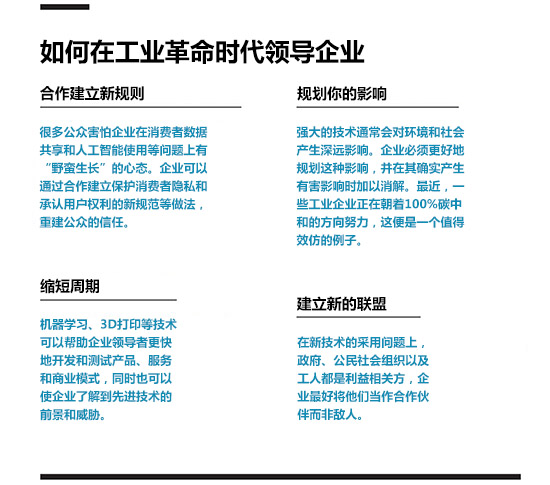贏得第四次工業(yè)革命的四種方法
|
在剛剛結束的一年里,無數(shù)事件已經(jīng)表明,,新技術正在迅速而深刻地改變著我們的世界——這個過程既充滿希望,,又潛藏著威脅。
比如說,,光是在最近幾個月,,Alphabet公司的Waymo部門便推出了美國的首個商用無人駕駛出租車服務;中國新華社打造出了世界第一位人工智能新聞主持人,;洛克希德馬丁公司則開始用3D打印技術為F35戰(zhàn)斗機制造零件,。
與此同時,因為不法分子使用社交媒體平臺操縱選舉,、煽動暴力,,一些社交媒體公司遭受了嚴格審查。還有一些全球最大的面向消費者的企業(yè)遭遇了數(shù)據(jù)泄露事件,,影響了數(shù)以億計的用戶,。另外,新技術使這個世界的富者更富,,分配不均日益加劇,,而廣大“無產(chǎn)階級”在經(jīng)濟和社會不安全感的折磨下,變得愈加仇富,。
這些事件提醒我們,,我們正在經(jīng)歷的變革已經(jīng)不再局限于商業(yè)范疇,它們代表了第四次工業(yè)革命的來臨,。
這場革命正在徹底改變世界,,其意義不亞于19世紀至20世紀的第一次和第二次工業(yè)革命。在前兩次工業(yè)革命時期,,最領先的技術是蒸汽技術,、電力、火車和汽車,。從20世紀60年代開始,,我們迎來了以計算機為核心的第三次工業(yè)革命。前兩次工業(yè)革命揭開了美國的“鍍金時代”,,而我們也從中發(fā)現(xiàn),,真正革命性的技術,遠不止一套機器或工具那么簡單,,而是能夠改變整個社會內核的強大驅動力,。
事后看來,有人可能會以為,,那些革命性時代的轉型過程是平穩(wěn)的,,而忘記了隨其而來的痛苦乃至暴力式的顛覆,。然而每一次革命在帶來進步的同時,也總會產(chǎn)生痛苦和沖突,,第四次工業(yè)革命也不會例外,。它帶來的變革會快速蔓延,輻射全球,,影響不計其數(shù)的人口,。
隨著時間進入2019年,為了廣大企業(yè)的自身利益,,同時為了社會的利益,,我們應該更加積極主動地參與到塑造第四次工業(yè)革命的進程中。如果放任自流,,到時技術便會來塑造我們,。在這個人工智能崛起和“獨狼”式襲擊者橫行的時代,安全風險也要比以往任何時候更高,。為了抵御第四次工業(yè)革命的負面沖擊,,我提出以下四點建議。
首先,,企業(yè)界必須積極開展合作,,圍繞新技術建立新的規(guī)范。無論是就用戶數(shù)據(jù)的所有權問題,,還是在城市道路上投放無人駕駛汽車問題,,抑或是人工智能、基因編輯和知識產(chǎn)權等問題,,總而言之,,企業(yè)都要與其他利益相關方進行協(xié)商。這些規(guī)范應該建立在自由和自主原則的基礎上,,比如說,,用戶應該擁有自己的數(shù)據(jù)的所有權,能夠不受限制地轉移這些數(shù)據(jù),,而人工智能和廣告定位則應該尊重某些隱私的邊界。
企業(yè)如果不能就此采取行動,,則有可能搬起石頭砸自己的腳,。目前,各國政府和公民社會都已經(jīng)表明了態(tài)度,,他們不會容忍借第四次工業(yè)革命搞“野蠻生長”的商業(yè)行為,。如果企業(yè)不進行適當?shù)淖晕冶O(jiān)管,政府就會出臺更多監(jiān)管,。與此同時,,國家機關與個人也要扮演十分重要的角色,。比如,只有立法部門才能通過立法手段,,確保新技術創(chuàng)造的財富被更公平地分配,。而工人和雇主也要共同努力,在利用科技取代舊崗位和投資培訓工人適應新崗位之間找到平衡,。
當今世界的基本國際格局是由聯(lián)合國和布雷頓森林體系塑造的,,各國政府及國際組織也有必要對其加以改造。許多基于當前這套國際秩序的規(guī)則都需要重寫,。而這也是馬上將于今年1月召開的達沃斯世界經(jīng)濟論壇年會的一個重要議題,。
合作并不代表企業(yè)不需要競爭、創(chuàng)新和發(fā)展,。因此,,我的第二點倡議是:現(xiàn)在,各行各業(yè)的企業(yè)領袖需要更多更快地進行試驗,。有了機器學習和3D打印等新技術和新工具的幫助,,企業(yè)可以利用實時收集的數(shù)據(jù)和反饋,持續(xù)測試新產(chǎn)品,,適應新技術,,從而為企業(yè)帶來了巨大的商機。 |
We’ve just concluded a year in which countless events demonstrated how rapidly and profoundly new technologies are changing our world—in ways both promising and threatening.
In recent months, to give just a few examples, Alphabet’s Waymo division launched America’s first commercial self-driving taxi service; China’s Xinhua News introduced the world’s first A.I.-powered news anchor; and Lockheed Martin began 3D-printing parts for its F-35 fighter jets.
At the same time, social media companies came under scrutiny, as bad actors misused their platforms to hijack elections and incite violence. Some of the world’s largest consumer-facing companies fell victim to data breaches affecting hundreds of millions of customers. And as new technologies helped the world’s richest people become wealthier than ever, inequality increased, and a disaffected “precariat”—racked by economic and social insecurity—turned its back on elites.
These events remind us that the changes we’re experiencing go beyond business as usual. Indeed, they represent a Fourth Industrial Revolution.
This revolution is transforming the world as thoroughly as the 19th-and 20th-century Industrial Revolutions did. Back then, the cutting-edge technologies were steam technology and electricity, trains and cars. Beginning in the 1960s, we saw a third such revolution, with computing at its center. From the first two revolutions, which led to the Gilded Age in America, we know that truly transformative technologies are far more than sets of machinery or tools. They are powerful actors that can change the very core of society.
In hindsight, one can see those transformative eras as smooth evolutionary journeys and forget the rough and even violent disruptions that came with them. But each revolution generated pain and conflict along with progress, and the Fourth Revolution will do the same. The changes it is creating are fast-moving and global, and they will affect governments, civil society, and huge swaths of the population.
Going into 2019, it is in businesses’ self-interest and for the greater good that we shape this Fourth Industrial Revolution more actively. Left unmanaged, technologies will shape us, and in the age of A.I. and malicious “l(fā)one wolves,” the risk of harm is greater than ever. To counteract it, I propose four points of action.
First, businesses must proactively collaborate to create new norms around technology. Whether in forming agreements about customer-data ownership, the right way to unleash driverless cars in city streets, or rules around A.I., gene editing, or intellectual property, businesses must engage with other stake- holders. Principles of freedom and autonomy can underpin those norms: Users should own their data and be able to transfer it without restrictions, for example, and A.I. and ad targeting should respect certain privacy boundaries.
Companies that fail to act risk shooting themselves in the foot. Already, governments and civil society are showing they will no longer accept business behavior that treats the Fourth Industrial Revolution as a latter-day Wild West. Expect more regulation if companies don’t move to sensible self-regulation. That said, state actors and private individuals have important roles to play. Only legislatures, for example, can enact laws that ensure a fairer redistribution of the riches new technologies bring. Workers and employers together need to find the balance between implementing tech that displaces jobs and investing in retraining for new ones.
Governments and international organizations also need to reinvent the United Nations and Bretton Woods framework that shaped the world we live in. Much of that international rules-based order needs a reboot. This will be a major topic at the annual meeting of the World Economic Forum (WEF) in Davos, later in January.
Cooperation doesn’t absolve companies of the need to compete, innovate, and evolve. Hence, my second point of action: Now’s the time for business leaders of all stripes to experiment more and faster. Companies have a tremendous opportunity to continuously test and adapt new products and technologies because they can utilize data and feedback gathered in real time— with the help of new tools like machine learning and 3D printing. |

|
第三,,企業(yè)需要采取適當戰(zhàn)略,,應對新技術帶來的風險。比如世界經(jīng)濟論壇的《全球風險報告》反復指出,,大范圍的網(wǎng)絡攻擊很有可能發(fā)生,,其影響將是非常嚴重的,而大多數(shù)企業(yè)仍然沒有做好應對這些攻擊的準備,。在2019年,,如果這些企業(yè)不去徹底地、結構性地解決這些風險,,屆時很可能會后悔莫及,。
最后,企業(yè)領導者必須深入了解大環(huán)境,,以及他們的行為可能導致的意外后果,,并相應地進行戰(zhàn)略調整。環(huán)境污染,、社會動蕩等外部因素與所有企業(yè)息息相關,,企業(yè)再也不能表現(xiàn)得好像這些與他們毫無關系一樣。
總之我們應該明白,,第四次工業(yè)革命不只會影響我們的工業(yè),,而且會影響整個社會,,影響全世界人民的生活。企業(yè)應該確保社會能夠從科技創(chuàng)新中受益,。就讓2019年在這方面帶來新的曙光,,讓它成為我們對新時代的共同宣言!(財富中文網(wǎng))
本文作者克勞斯·施瓦布是世界經(jīng)濟論壇創(chuàng)始人,、主席,。
本文的另一版本刊載于2019年1月刊的《財富》雜志上,題目是“為什么企業(yè)必須站出來塑造下一次工業(yè)革命”,。 譯者:樸成奎 |
Third, businesses need to adopt adequate strategies to respond to technology-driven risks. The WEF’s Global Risks Report has shown time and again that widespread cyberattacks are both likely and very impactful, for example, but most companies aren’t well equipped to handle them. In 2019, companies may well regret it if they don’t address such risks in a thorough, structural way.
Last, business leaders must do more to understand the wider context in which they operate and the unintended consequences their actions may have, and revise their strategies accordingly. No longer can businesses act as if externalities such as environmental damage or social unrest don’t exist or aren’t their responsibility.
Through it all, we should understand that the Fourth Industrial Revolution will affect not just our industries but also society and the lives of people everywhere. Businesses need to make sure society benefits from technological innovations. Let 2019 be a new dawn on this front. Let this be our joint pledge for a new era.
Klaus Schwab is the founder and chairman of the World Economic Forum.
A version of this article appears in the January 2019 issue of Fortune with the headline “Why Business Must Step Up To Shape The Next Industrial Revolution.” |
?













